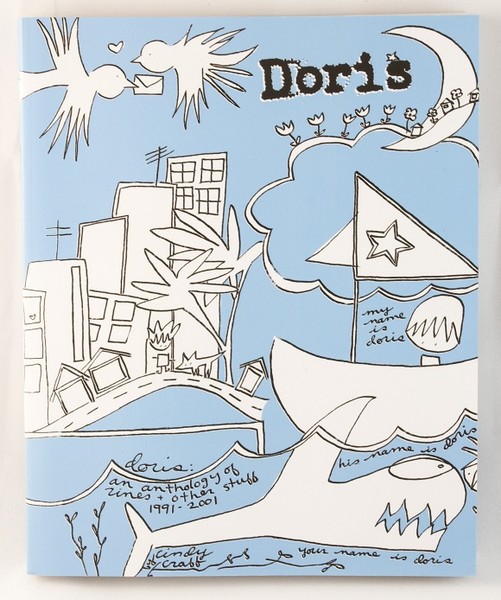
Doris Book: an anthology 1991-2001
by Cindy Crabb Author
Cindy writes her zine, DORIS, like she is figuring out the human condition. She makes writing about the simplest and most common things - playing music, childhood, cooking, or sex- resonate with universal understanding. She helps us make sense of more complex things like the satisfaction of doing useful work, natural curiosity, the ability to use logic, gender dynamics, introspection, the need for challenge and change, combating depression, and creating art and literature. She shares and explores the emotions that go along with having an abortion, rape, dealing with the death of family, or sexual harrassment in a context that is enlightening and personal, feeling like a close friend opening up to you. What's most impressive though is that she relates these things into every article in her zine seamlessly.
You must log in to comment.
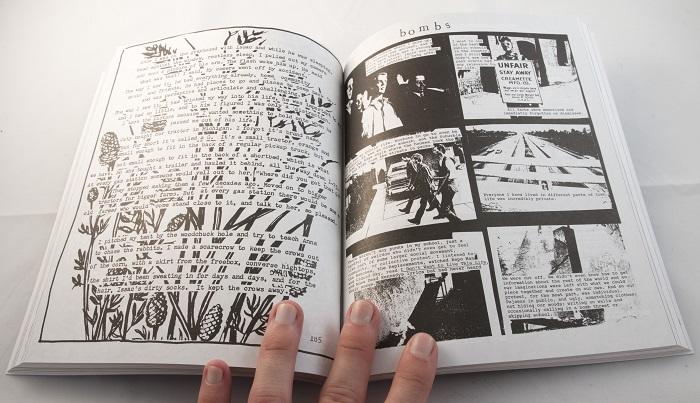
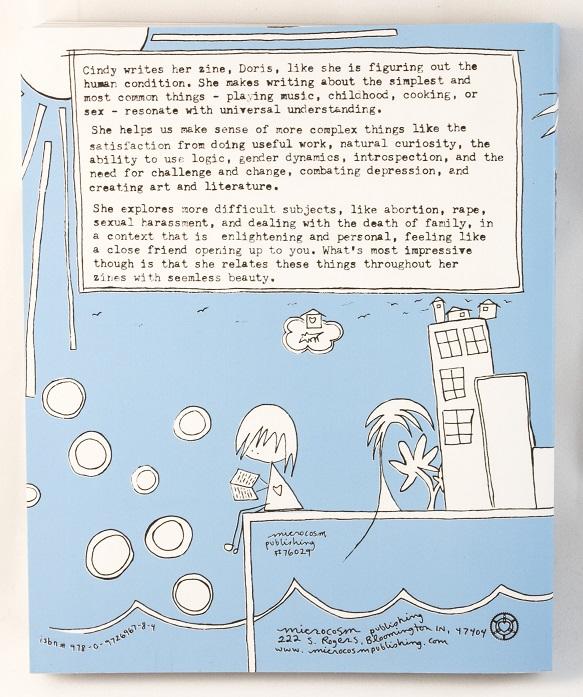


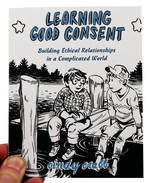
![Learning Good Consent: On Healthy [AK Press book] Relationships and Survivor Support](/previews/learninggoodconsent.jpg)
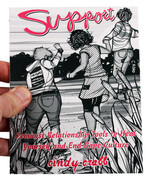
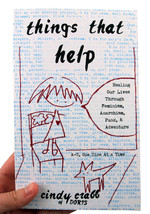

Comments & Reviews
"Doris was a book my best friend picked up in Toronto whilst spending a summer there. Little did I know that it would be my first taste of zines. The book is an anthology of most of the first eighteen issues of Cindy Crabb's Doris zine, which you could say is a journal of Crabb's experiences combined with thoughts on various subjects. Handwritten & typed with illustrations throughout, I remember being glued to this book, it was like nothing I'd read before. The topics varied almost from page to page, some short & concise, some reoccurring. Despite the fact that Cindy would have been writing to anyone who would read, it kind of felt like she was confiding in you, sat on the curb watching the world go by."
"All the issues of Doris have been collected and released as an anthology. It's so exciting! Everyone should read it. It really actually will make you laugh and cry. Cindy tells the fascinating stories of her life honestly, sweetly, and smartly and manages to include helpful tips, history and information on all manner of topics ranging from feminism and politics to travelling and making art. It's very close and immediate like a friend telling you stories and secrets but you also come away knowing all about the history of political collectives in Philadelphia or something like that."
“Ten years of zineing in one beautifully printed volume … is a lot of dedication. It is a lot of stories, pain, heart, and evolution. Cindy Crabb’s goals for Doris are lofty zine boilerplate: changing perception, community, love, media, meaning, and demonstrating that people do feel real things. … an extensive, mostly good, sometimes great piece of work.”
"doris is one of the best things out there as far as zines go and this is a DECADE of zines in one container."
I randomly met her and she gave this to me and I love it -- Thank you cindy! Sorry about the non-band.
Cindy Gretchen Ovenrack Crabb is a mystery to me. I guess I understand the politics of dropping out and existing off the grid, working when you need to, living ethically. And make no mistake, Cindy is not a hot topic punk - she walks the walk, and better yet has documented it for about fifteen years. What I don’t understand is why she doesn’t surface from time to time and get her work in a mainstream magazine. She has amazing stories to tell, and the skill is there. Her narrative voice is direct and clear and cozy, like that of a veteran storyteller. What better way to jar the somnambulist populace out of their stupor than to occasionally send out a missive from the real underground?
Cindy’s writing reminds me of the Beats, and it’s probably the closest thing to the promise showed by Kerouac and Burroughs when they wrote their reportage in that comfortable yet confrontational style all those years ago. There is a freedom in Cindy’s writing, a disregard of who may be reading – or rather, an awareness that whoever is reading doesn’t matter, that once the words are on the page they are free to find their own way. Doris: An Anthology is essentially a diary, but entry after entry, what accumulates is something more. It becomes a political statement, a family story, a travelogue, and an autobiography all at once, and it is a compelling and engrossing read.
Microcosm Publishing is responsible for this collection as well as the excellent On Subbing, and I hope they find enough success that they continue anthologizing zine literature into volumes like these. The zine format is close to my heart, but it’s ephemeral nature distances it from young people without access to big-city distro points or the internet. Collecting zines into books may also legitimize the format for library buyers. This Doris will hopefully find its way into libraries where it can be discovered and shared and whispered about. I think Crabb’s stories will resonate with many young women – heck, people – regardless of their social status. I loved it.
For 15 years, Cindy Crabb’s hand-written and paste up zine Doris has served as a much needed reminder that the personal is political. She touches on concepts like anarchism, feminism, and community building, weaving complex ideas into simple stories and drawings about herself, her family and friends, and everyday experiences. Reading Doris is always an educational experience, but feels more like a wise friend opening up to you rather than an authority talking at you. She explores her own struggles with abuse, incest, and depression with honesty and simplicity, in language that renders those difficult topics eminently relatable to her readers. And no matter what she’s writing about, she always seems to land on the side of hope. Doris: An Anthology was published by Microcosm last year. More recently, Cindy worked with a few others on a collaborative zine called Support, which seeks to advocate for survivors of sexual assault and abuse. She found it extremely taxing to work on, but felt politically obligated to do it, as she had identified a lack of effective tools for opening up discussions on consent and the subtle ways abuse and manipulation can happen, even in self-described radical movements.
Who’s my favourite zine writer? A nomadic girl whose name may be Cindy, and whose type-written life story I’ve been following for a decade, clutching the photocopied, stapled paper as though they were letters from a long lost sister. Doris is the zine I drag my hungover ass to zinefairs for, playing invisible pinball with all the people I don’t feel like networking with, all to get my Doris fix. She writes about sex and girlhood with brave authenticity, taking us on her bike rides, to the treehouses and squats she lives in and to Siberia, through her heartache and on her political explorations. Her ability to succinctly and tenderly portray her mistakes, sadness and hope on paper is matched by no other personal zine writer I’ve come across over the years, and her commitment to documenting her journey is unwavering. Though I have as many individual issues as I have kept track of over the years, having a collection of her writing and personal doodles and maps, was a dream come true, in the most earnest sense possible. Cindy is the reason I’m glad riot grrrl didn’t entirely kill personal zines.
Cindy Crabb is a gentle genius.
It's hard to explain why Doris is such a great zine. I think it's the fact that it's such a small and personal thing, but at the same time is very, very important. She makes you feel like you're not alone. This is a wonderful anthology.
Cindys writting saves me. This anthology floored me, I opened it up and didnt stop reading (read while cooking, while eating, while useing the bathroom and terribly while being talked to on the phone) till I finished it and even then I couldnt stop carrying it around. Seriously.
Thankyou Cindy+Microcosm!
Universal as in everybody eats, we're alive, we feel; but the overall statement of Doris is that the "universal" is the greatest enemy of not only the individual and the artist, but humanity itself. In that sense alone does the personal aspect of Doris resonate the universal: subvert it, smash it. What the universal represents is uniformity, conformity, hatred, genocide. What Doris sets forth politically is an us/them mindset where through courageous acts of sincerity and communication conscientious communities can be formed as antidote to the petty slander and everyday bullshit of men and women engaged in self-defeat. The writer delivers herself over to the public as a radiant part of the universal, a part whose emulation would go a long way in solving the world's problems. This is, of course, outrageously idealistic, and is part of the charm of her stories, essays, and drawings, that in the face of the impossible she believes. What one gets in Doris is a wealth of life loved and lived, an arresting picture of the vicissitudes of girlhood in question, womanhood, whathood. Delivered through a dialectical prose style of remarkable beauty and intelligence, this endearing, funny, poignant book stands out as a gem on the garbage heap of American literature where, generally speaking, universals are legitimized and maintained.
I looked forward to this anthology being published all spring, and now that it's finally here, I feel like I'm finally seeing the foundations of the Doris saga that I got in on around issue 14. Cindy is an amazing writer in a way that gets me thinking, dreaming and writing. If you like Doris or have never read it, get this book, cause they're gonna go fast, and cause Cindy takes the personal and makes it connect with the universal so well.
Doris is one of the most popular and well-respected zines of the past decade, and now it's possible to catch up on the first 10 years with this handy anthology. After sitting down with this you'll feel like you know [Cindy Crabb] better than you know yourself, which is the inherent weirdness of the personal zine. The only real caveat here is to take this in many, many sittings and space it out, as Cindy herself advises in the introduction. The writing itself is, at times, wonderful and thought provoking, comforting, and inspiring. A wonderful way to get acquainted with Doris, or a good chance to replace copies that are sitting around abused from too much lovin'.
I have a hard time identifying with Cindy a lot of times in this book, which is a collection of her zine Doris from 1991- 2001. The again, there are a number of epiphany’s and observations within these pages that I totally understood and empathized with as well. Also of note, is that many of the excerpts in here are stories about things like dumpstering, street riots, community gardening, squatting, and so forth. The interesting thing about all these excerpts about these issues is that they took place probably in the late 80’s or early 90’s according to Cindy’s timeline. It’s kind of cool to know that a really old-school punk was living this way a good 10 years before a lot of the rest of the scene caught on. Regardless, there are a lot of cool things in this book, which is mostly a combination of silly-drawn comics and stories about Cindy’s life as she moves all over the US, exploring her life’s purpose, and the conclusions (or lack thereof) she comes to about them. These are her experiences with people from Vermont to Siberia, living on both coasts, and travelling to remote regions of the Earth. Of dealing with depression, family abuse, shitty roommates, and lack of motivation. Of organizing, fucking, gardening, rioting, packing, and packing it in. Many of these stories are amusing and fun to read. Others I really can’t relate and was somewhat upset by. But then again, I cannot comment all that much seeing as it’s not me or my situation. I just walked out of those sections with a bad taste in my mouth. Otherwise, this was an interesting read that will both cause some strong feelings no doubt, and also inspire some critical thinking, or at least musings on our own lives and how we live them.
Doris is a zine relic as Cindy’s zine is DIY at it’s finest. I believe Cindy was born to create this zine as it seems like she almost effortlessly created Doris with her typewritter, pen, and a glue stick. And for ten years Ms. Crabb had not skipped a beat.
Doris is a zine by Cindy Crabb. It’s hard to know exactly who Cindy Crabb is, which is strange because Doris is mostly about her life. However, it’s not presented in chronological order, as an autobiography would be; the issues in this anthology skip back and forth in time, touching on various incidents, people and places that have shaped her life. At first the reader may feel like a bit of a detective, trying to piece together where she has lived and when (Minnesota; Vermont; Portland, Oregon; San Francisco and Asheville, North Carolina). She frequently mentions her sister, Caty, and many of their adventures together. We learn about her mother, a mentally unstable alcoholic who was in an abusive marriage with her father, of whom Crabb has both good and bad memories. We also learn that Crabb is an incest survivor, at the hands of that stepbrother. There are numerous friends whose names keep popping up throughout this anthology, which includes all but one of the first eighteen issues of Doris. But to read Doris with the aim of finding out who its author is would be to miss the point. While most of the book relates personal anecdotes, there are political stories interspersed – such as the history of Jane, a network of women that provided abortions before the procedure was legalized and MOVE in Philadelphia, whose house was bombed by police in May 1985. Among the myriad of topics Crabb addresses in Doris are her inability to understand boredom, her determination to work for a better world despite the obstacles, her adventures as a student at Goddard College in Vermont (where near-anarchy was practiced at the time), trips driving across the country, the homogenization of American culture, the pressure (particularly on women) to have children, dealing with depression, and the difficulty committing to life as an artist and forging one’s own community. On the last topic, she writes, "There’s something powerful about creating a life that looks like a writer’s life… Where it’s so hard to start because every word is supposed to be something, and endings are supposed to be clear and dramatic. I can’t think of anything worth writing about, so I write about the stupidest things." It is often in the "stupid things," however, that we get glimpses of the profound, and Crabb’s collection – which also includes letters to and from friends, several short stories, and many illustrations and comics – includes many revelations.
When I first started reading I thought the cover was an inappropriate choice, but by the time I finished the book (which I ended up reading voraciously) I realized it was absolutely perfect. The author is about as far from the stereotypical indie kid as you can get. Cindy is a punk - she is an anarchist-activist-squattin'-dumpsterin'-punk no less, and she writes intelligently, but in a way that is accessible, about her experience and that of her friends in a personal way and yet the messages are very universal. This is a collection of Cindy's wildy popular DORIS zine spanning ten years of publication. I'm totally kicking myself for not discovering it back then. Doris works perfectly as an anthology - these are the kind of zines you would keep forever and on particularly lonely or frustrating days you could take a stack of them outside and curl up and read them to totally change your mood. Her words and images have the power to feel as intimate as a best friend and as empowering as marching with millions of other protesters at a rally. Cindy has an innate ability to celebrate the simple joys of nature, drinking coffee, riding a bike, cooking, growing things, talking with friends, writing, making music, and being alone. Both Cindy's badass activism and near Buddhist approach to life are awe-inspiring as well as action inducing.
I only discovered Doris fairly recently having heard the name in Maximum Rock N Roll, or equivalent, and then being fortunate enough to find a copy of her latest issue in the Punker Bunker. This then is the first book of Cindy's first ten years of writing Doris. Unlike some other zine anthologies Doris hasn't had much re-writing for the book format, and it looks like the pages from the zine have been taken and put straight into book format (typos and all). It works really well, though I suppose it probably helps that Cindy is a kick-ass writer and able to articulate cool ideas without resorting to long, or pretentious explanations. As she notes in the introduction it is slightly weird trying to read ten years worth of material all at once, especially since there were over 6 month gaps between some of things written. Each story is often disconnected from the one before it, or the one after, even if they all share the same basic theme. Its surprisingly nice to read something like that though. It means if you've only got ten minutes to spare you can plow through a couple of stories, and then come back and start on new stories when you have the time. I thnk it probably works better reading it like that, then to try and read it all at once. It's cool though seeing how Cindy's writing style, ideas, and opinions have changed over the course of ten years and how things have changed for her. As she points out the end of the book isn't really the end at all, since she's still living her life and producing Doris. If you've never read Doris before, this would be a good place to start from.
This thick book compiles a decade of handwritten personal zines that feature storytelling so compelling that it really deserves the deluxe presentation. This is the journal of a woman trying to figure out life by piecing together the stories she has experienced. Unlike Cometbus, there's not a sense that she's experienced punk bohemia as a source of material; she just lives a life she needs to and then reflects on relationships, art, food, sex, pets, values, home, family, and more, in ways that are compelling to others while really personal to her. If you don't get why folks would read a journal zine, this is a good place to start.
Doris is about idealization and its correlation, disappointment. It's about disenchantment and the hope that unlies it. It's about people and politics and projects that fall through. It's about making plans and changing plans and hating when plans become plans, not life. And then making more plans. Doris chronicles ten years of figuring out how to live, how to be fulfilled, how not to be depressed, how to negotiate the desire for connection and community and the desire for solitude, simultaneously. Doris weaves together personal narratives, travel narratives, fiction, letters, comics, sketches, in pieces that are ruminations on the past, comments on the present, or projections for the future. You could pick up Doris and start reading anywhere and it would all cohere; each piece in each issue resonates with the same fundamental concerns: who and how to trust, how to love, where to find home, how to feel at home in your city, in your body. But to read straight through offers an observable manifestation of the passage of time, marked out by the events of a life.
The passages Cindy writes about her struggle to come to terms with her relationships with both of her parents are particularly moving, but especially those in Doris #18, "September" and "Minnesota," in which she writes about the confusion and despair she experiences dealing with her mother's death. Immediately following both pieces are recipes for ginger snaps and toffee bars; somehow they fit in with Doris's theme of the search for emotional sustenance amidst the anguish and disillusion of real (unromanticized) life. In like manner, Cindy makes sure to leave her readers, via her "Outroduction," with a happy ending, "not that hard end", but a hopeful one. It's not sickly sweet, though; it simply confirms the sense of hope that pervades Doris, a hope that provides the impetus for changing the world that creates new stories.
"Expansive and deeply contemplative, and contrary to any concerns that Cindy mentions in her intro, the seventeen issues compiled here don't lose anything as a book. I'm astounded at the cohesiveness. Ten years of my zines certainly wouldn't be as uniform or aesthetically pleasant. It took me forever to discover what Cindy knew instinctively; everything's handwritten or typed up manually, with numerous doodles and comics to grab an eye. Stories of traveling to Russia, around the United States. Gardening, writing letters, staying up late, and being hassled by police. Abortions, and break ups, and things that can only happen while drunk. Building a house, spreading self awareness. You get the idea. Generic as it sounds, I was inspired."
Doris has been one of my favorite zines of all time and so when I received this thick little book I was beyond excited. It is an anthology, something that some long time zine authors have been jumping onand it is such a great idea! Inside we find ten years of Cindy's writings and drawings from the earliest ideas of creating a zine to the natural progression of telling universal stories of her life and those who inspire for an audience. She has the ability to pull the reader in like a friend, telling secrets and tales taht you feel special to be a part of knowing. Doris is a kind of simple magic, weaving the simplest details into huge life altering moments and vice versa. It pulls you in through personal writings but also gives ideas, thoughts and questions to those experiences; something to always learn from. I highly recommend this bible of sorts to Doris zine!
There is probably little I can say about Doris that hasn’t been said before. Cindy’s zine is one of a tiny fistful of personal zines that get it just right. Full of wonder at life, while unafraid to show the suffering that comes along with it, yet lacking in any whiny self-indulgence, Doris takes readers places they need to go, whether they knew they needed to or not. Having all this writing in one book is important. Even if you’ve been reading the zine for years, I recommend reading this cover to cover. There is a narrative arc, although it is sometimes not shaped the way you might expect. But it’s there, and once you reach a certain point in the text, you can’t imagine stories being told any other way.